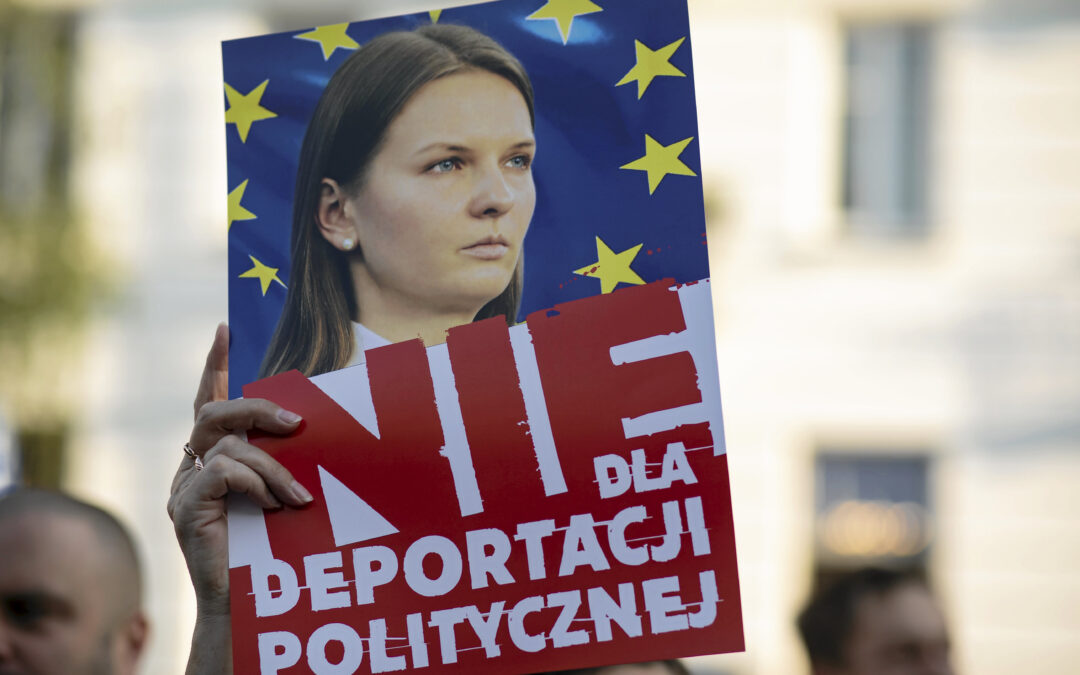A court has overturned the controversial entry ban that was issued by Poland’s former Law and Justice (PiS) government against Lyudmyla Kozlovska, the Ukrainian head of a Warsaw-based NGO.
PiS figures justified the ban on security grounds, though details of the alleged threat represented by Kozlovska were never revealed. She has always claimed to have been targeted for political reasons, due to her and her husband’s criticism of the PiS government.
Huge #Victory: the Polish #Warsaw Regional Administrative Court on 13 December 2023 ordered the Office for Foreigners to remove me from the list of undesirable foreigners in the territory of #Poland.
In 2018, after many years, I was expelled from Poland at the personal request…
— Lyudmyla Kozlovska 🇪🇺🇺🇦 (@LyudaKozlovska) January 4, 2024
Kozlovska, who is president of the Open Dialogue Foundation (ODF), has been unable to enter Poland since 2018, when the head of the country’s Internal Security Agency (ABW) entered her into the Schengen Information System (SIS).
That also in theory meant she was banned from entering most European Union member states. However, Kozlovska, whose foundation has offices in Warsaw, Brussels and Kyiv, travelled within the EU during that period and was even been invited to speak in the European Parliament and Bundestag.
Eventually, her name was removed from SIS but she remained barred from entering Poland. Kozlovska has never been informed of the specific reasons for her ban, which she says made it difficult to mount any kind of defence.
Her foundation believes the material used by the Polish authorities to justify her ban was likely based on false information from Moldova, Kazakhstan and Russia. It also notes that Kozlovska’s ban came after her Polish husband, who is also involved in ODF, published a widely shared guide to civil disobedience against the government.
Poland's decision to ban Ukrainian NGO head @LyudaKozlovska from entry is unjustified, a top court has ruled.
Kozlovska argues that the ban, issued on unspecified security grounds, is political and linked to her organisation's criticism of the governmenthttps://t.co/qbp3JCxqnI
— Notes from Poland 🇵🇱 (@notesfrompoland) December 6, 2022
In 2022, Poland’s Supreme Administrative Court (NSA) ruled that Kozlovska’s entry ban did not have a justifiable basis. Now – in a ruling issued last month but only reported yesterday – a lower court has ordered that she be removed from the government’s list of undesirable foreign citizens.
“In 2018, after many years in Poland I was thrown out at the personal request of Mariusz Kamiński and Maciej Wąsik,” said Kozlovska yesterday, referring to the PiS minister in charge of the security services and his deputy. The pair were recently given prison sentences for abuse of power in a separate case.
“I hope that in the new political situation, the administrative authorities will comply with the court’s verdict and end the malicious political persecution of activists,” she added. A new government, led by Donald Tusk, took power last month.
Kozlovska’s husband, Bartosz Kramek, also celebrated the ruling but called it “bitter justice” given that it had taken six years of legal efforts, reports news website Onet. The court’s decision is not yet final as it can still be appealed by the government’s Office for Foreigners.
⚖️Kolejna przegrana PiS: po prawie 6 latach walki, w przełomowym wyroku Wojewódzki Sąd Administracyjny wprost nakazał usunąć zakaz wjazdu @LyudaKozlovska do Polski, uznając go za bezpodstawny. Zakaz został dokonany, przypomnijmy, na polecenie @Kaminski_M_ i @WasikMaciej.…
— Open Dialogue Foundation / Fundacja Otwarty Dialog (@ODFoundation) January 4, 2024

Notes from Poland is run by a small editorial team and published by an independent, non-profit foundation that is funded through donations from our readers. We cannot do what we do without your support.
Main image credit: Dawid Zuchowicz / Agencja Wyborcza.pl

Daniel Tilles is editor-in-chief of Notes from Poland. He has written on Polish affairs for a wide range of publications, including Foreign Policy, POLITICO Europe, EUobserver and Dziennik Gazeta Prawna.



















